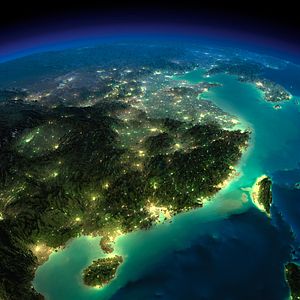“We underscore the importance of peace and stability across the Taiwan Strait, and encourage the peaceful resolution of cross-Strait issues.”
This succinct sentence made its first ever appearance in a Summit Communiqué of the Group of Seven (G-7) on June 13. Two days later, the same content also appeared in the EU-U.S. Summit Statement for the first time. The stress on peace and stability across the Taiwan Strait followed several high-level joint statements in the second quarter of 2021: the Australia-Japan 2+2 Foreign and Defense Ministerial Consultations earlier in June, the EU-Japan Summit , the South Korea-U.S. Summit, the G-7 Foreign and Development Ministers’ Meeting in May, and the Japan-U.S. Summit in April.
The 2021 G-7 Summit – aiming to recover from the pandemic and to “build back better” – was under an unusually bright spotlight. Political leaders around the world are watching closely to see how the new U.S. administration and its partners negotiate on a common agenda. That includes what items will be included in the shared priorities that concern them.
The inclusion of the Taiwan Strait issue as a shared agenda item – under the “Global Responsibility and International Action” heading – was not an easy decision among the seven capitals. According to political and diplomatic sources cited by a Tokyo-based news agency, before the summit, the G-7 sherpas of France and Germany argued that since the Taiwan Strait issue had been touched upon clearly in the Foreign Ministers’ joint statement a month ago already, it might not be necessary to bring up the issue in the leaders’ communiqué. France and Germany were looking to mitigate the irritations to Beijing. The U.S. and Japanese representatives, on the other hand, suggested the necessity of such a move, arguing that the situation in the Taiwan Strait is a topic closely linked to their national security and that failing to mention it would deliver the wrong impression that the leaders collectively have no concerns over the issue. The sherpas thus left the decision to the heads of state and government over the course of the summit. It was not until the morning of the last day of the summit that French President Emmanuel Macron and German Chancellor Angela Merkel agreed on including the Taiwan Strait issue in the communiqué.
It is understandable and fair that the EU and the United States do not always share the same threat perception, security interests, and preferred approach when it comes to China. However, peace and stability across the Taiwan Strait undoubtedly fits the EU’s values and interests.
First, let’s start with with the European Parliament’s draft report on a new EU China strategy announced at the end of April 2021. Item 19 “[c]alls on the VP/HR [the EU’s diplomatic chief] to coordinate the Union’s actions with like-minded partners on (…) the defence of liberal democracy in the world, notably in (…) Taiwan, and with a view to engaging China to respect (…) the peaceful resolution of disputes.” The Taiwan Strait issue may provide a chance for the EU to illustrate its action of support to democracies and to resolve contentions through a peaceful manner.
There’s also the well-known document “EU-China – A Strategic Outlook” issued in March 2019, and later adopted by the European Council as an official position of the EU as a whole in October 2020. It holds that China may be a partner, a competitor, and a systematic rival depending on the policy areas concerned. Therefore, the EU’s endorsement of peace and stability across the Taiwan Strait – with Beijing and Taipei representing two contrasting systems of governance – may showcase how the EU will be able to implement its China strategy in a concrete way.
Meanwhile, “A New EU-US Agenda for Global Change,” published in December 2020, stated that:
[C]loser partnership in different geopolitical arenas will also be crucial to support democratic values around the world, as well as global and regional stability, prosperity, and conflict resolution. (…) The approach set out in the EU-China Strategic Outlook provides a solid roadmap to defend our common interests and values. As open democratic societies and market economies, the EU and the US agree on the strategic challenge presented by China’s growing international assertiveness, even if we do not always agree on the best way to address this.
The Taiwan Strait issue provides a golden opportunity for two sides of the Atlantic to jointly uphold their shared values on democracy, to advance peace and prosperity in the Indo-Pacific region, and to respond to Beijing’s assertive behaviors together.
As the 2016 EU Global Strategy indicated, “There is a direct connection between European prosperity and Asian security. (…) We will also develop a more politically rounded approach to Asia, seeking to make greater practical contributions to Asian security.” It is time that the EU joins its Indo-Pacific partners to contribute to security in the region – the Taiwan Strait included – which will directly contribute to the own prosperity of the EU.
Last but not least, the 2016 “Elements for a new EU strategy on China” explicitly stated:
[t]he EU confirms its commitment to continuing to develop its relations with Taiwan and to supporting the shared values underpinning its system of governance. The EU should continue to support the constructive development of cross-Strait relations as part of keeping the Asia Pacific region at peace. Accordingly, the EU will use every available channel to encourage initiatives aimed at promoting dialogue, co-operation and confidence-building between the two sides of the Taiwan Strait.
A firm commitment with regards to the Taiwan Strait issue is indeed in line with the EU’s strategy on China.
Endorsing and engaging in peace and stability in the Taiwan Strait does not mean choosing the U.S. side in order to counter China. It is rather an illustration of the EU’s dedication to uphold its values and safeguard its interests, which is in concert with its own China strategy.
































